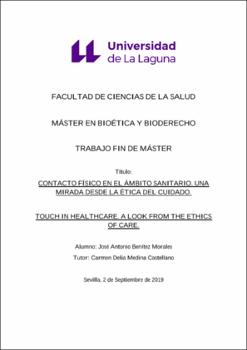Contacto físico en el ámbito sanitario. Una mirada desde la ética del cuidado.
Fecha
2019Resumen
Introducción: La relación sanitario-paciente en muchos casos se ha convertido en un intercambio frío, en el que la información parece fluir sólo en sentido profesional-usuario. El contacto físico humano ha sido relegado a la cola de la prioridad frente a objetivos demasiado enfocados a resultados político-económicos. Objetivo: El objetivo principal de este trabajo es analizar la percepción sobre el contacto físico en el ámbito sanitario; así mismo, se pretende identificar, evaluar de forma crítica y reunir las principales evidencias disponibles sobre los beneficios del contacto físico en el bienestar global del paciente. Metodología: Se desarrolló un estudio descriptivo mediante un cuestionario autocumplimentado sobre el contacto físico humano, dirigido a profesionales sanitarios. Los resultados se analizaron con el programa estadístico SPSS. Resultados: En la revisión fueron incluidos siete estudios que suman 1400 pacientes. Se encontraron signos de mejora en los mismos con la implementación del contacto físico humano principalmente en el dolor y ansiedad en personas atendidas por diversas patologías. Tras el análisis del cuestionario se observa una tendencia a una visión positiva de los profesionales sanitarios sobre los beneficios del contacto físico humano, así como una actitud favorable ante el mismo. Conclusiones: El contacto físico humano es un factor clave en la mejora del bienestar global del paciente. Los profesionales sanitarios son conscientes de ello, encontrando el principal escollo para su aplicación en la falta de tiempo. Por ello, y por la insatisfacción con respecto a la formación recibida, se propone el desarrollo de un programa formativo para educar a profesionales sanitarios en la importancia de un cuidado humano de calidad y la mejora en la optimización del tiempo disponible. Introduction: The health-patient relationship in many cases has become a cold exchange, in which information seems to flow only in a professional-user sense. Humane touch has been relegated to the last positions of the priority queue in favor of objectives too focused on political-economic results. Objective: The main objective of this work is to analyze the perception about touch in the health field; it is also intended to identify, critically evaluate and gather the main available evidence on the benefits of physical contact in the patient's overall well-being. Methods: A descriptive study was developed through a self-filled questionnaire on humane touch addressed to health professionals. The results were analyzed with the SPSS statistical program. Results: Seven studies involving 1400 patients were included in the review. Signs of improvement were found in them with the implementation of humane touch mainly in pain and anxiety in people treated by various pathologies. After questionnaire’s analysis, there is a tendency towards a positive vision of health professionals about the benefits of humane physical contact, as well as a favorable attitude towards it. Conclusions: Humane physical contact is a key factor in improving the overall wellbeing of the patient. Health professionals are aware of this, finding the main obstacle to its application in the lack of time. Therefore, and because of the dissatisfaction with regard to the education received, we propose the development of a training program to educate health professionals about the importance of quality humane care and the improvement in the optimization of the time available.





